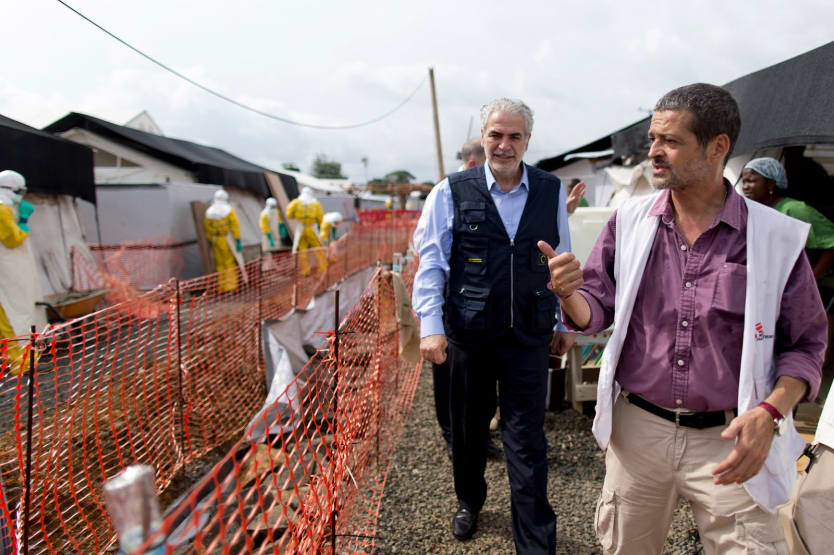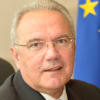
Mahatma Gandhi once said that “it is health that is real wealth and not pieces of gold and silver.”
The ongoing Ebola epidemic — and the dreadful toll it is taking in terms of lives lost and potential wasted — has brought this home to us all too clearly.
The European Union is working hard to help tackle the epidemic, under the able coordination of my colleague, Commissioner for Humanitarian Aid and Crisis Management Christos Stylianides. We have put in place a response package of over 1 billion euros ($1.24 billion) to support our partner countries in their efforts to contain this terrible disease.
We have been setting up mobile laboratory units, Ebola treatment centers and a logistical air bridge, providing medical and protective equipment and helping raise public awareness about the epidemic. The European Commission has also dispatched humanitarian experts to the region and is coordinating and supporting the transportation of aid, equipment and personnel to hot spots in the countries affected by the disease.
This emergency response is, of course, vital. But the epidemic’s impact will be felt for years — which is why our development cooperation with partner countries in the region must go well beyond immediate measures and cover long-term planning. In Guinea, for example, where health is a focal sector, we will help rehabilitate and equip health structures at local level, upgrade sanitary conditions and improve health service delivery.
More broadly, a 28 million-euro regional program has just been launched to support health care systems in Ebola-affected countries as part of our Linking Relief, Rehabilitation and Development efforts.
We are boosting EU research funding on Ebola and working with our industry partners to develop vaccines and medications and thus, we hope, save more lives around the world. And with neighboring countries also at risk, we are looking with governments, other donors and civil society across the region at how we can support their preparedness activities.
It is clear, then, that to face down this multifaceted crisis we need a multidimensional, coordinated response, also for the post-crisis recovery process. Countries affected by the epidemic have been challenged extensively to provide a sustainable response. There are many terrible stories of those who have suffered at the hands of the disease. Theirs are not only stories of poor health services — but of much wider challenges, including weaknesses in governance, poor education systems, poor health services, poverty and limited economic development in key sectors like agriculture. The Ebola response must enable affected countries to pay their health workers. It must support the recovery process in key focal sectors like education and agriculture. Getting children back in school, adults back to work and food security and harvests back on track is vital. And it must help strengthen health systems and preparedness in the medium to long term. Countries with stronger health systems stand a better chance of cushioning the impact of the epidemic on the economy and on society.
See more news on the Ebola crisis:
● How UNMEER is leading the fight against Ebola
● Ebola puts humanitarian supply chains to the test
● EU Ebola czar prepares action plan after West Africa trip
● Peter Piot's 4 tips to fight Ebola
● Partnerships for Ebola: Pharma industry’s $351M push to stop the outbreak
In 2007-2013, the European Commission alone devoted nearly 3.2 billion euros in development resources to health; three-quarters of that funding went to support health systems in 40 countries worldwide.
We will continue to work with partner countries and partner organizations to keep health issues at the forefront of development cooperation worldwide. Partner country governments in particular have a great role to play, for their health systems and health workers carry out much of the work on the ground. And the Commission has long understood just how much added value health partnerships can bring. They really can prove to be greater than the sum of the part(ner)s that make them up.
That’s why we work with organizations like the Global Fund to fight AIDS, Tuberculosis and Malaria and the Gavi, the Vaccine Alliance to complement the key support we give to health systems in our partner countries.
The European Commission is proud to have been associated with the Global Fund ever since its inception in 2001 and with the impressive results it has achieved. And now, as we look to further increase the global resources to fight poverty-related diseases, the time has certainly come for us to step up our efforts to leverage additional resources and broaden the donor base of the Global Fund, which started life as a public-private partnership. To this end, we should be calling on other donors like the private sector to scale up their contributions. This is just one example of how we believe the private sector can play a more central role as a partner for development.
Gavi is another PPP that we are proud to support, because we truly believe in what it stands for and the tangible difference it makes on the ground in helping countries maintain and increase immunisation coverage. It is a key player in our efforts to meet Millennium Development Goal 4 and reduce mortality rates in children under 5. And progress towards one health MDG boosts progress all round, because health issues influence all the MDGs. Thanks to all the donors working together within the alliance — including the European Commission — close to half a billion children have been immunized since 2000, resulting in 6 million lives saved. The EU is committed to delivering more lasting results like these through our Agenda for Change, the policy to refocus our aid to prioritize those sectors and countries where the need is greatest and where we can make the biggest difference.
The EU’s commitment is my commitment. I sincerely believe that we can give our fellow human beings a permanent route out of the mire of poverty and into a world of opportunity and potential. But none of us can fulfil our potential if we are denied the basic human right that is health. And no amount of gold and silver can alter that.
Want to learn more? Check out the Healthy Means campaign site and tweet us using #HealthyMeans.
Healthy Means is an online conversation hosted by Devex in partnership with Concern Worldwide, Gavi, GlaxoSmithKline, International Federation of Pharmaceutical Manufacturers & Associations, International Federation of Red Cross and Red Crescent Societies, Johnson & Johnson and the United Nations Population Fund to showcase new ideas and ways we can work together to expand health care and live better lives.
Search for articles
Most Read
- 1
- 2
- 3
- 4
- 5








